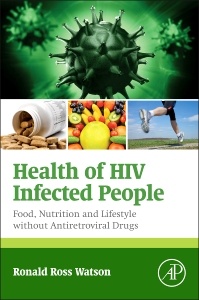Health of HIV Infected People Food, Nutrition and Lifestyle without Antiretroviral Drugs
Coordonnateur : Watson Ronald Ross

Health of HIV Infected People: Food, Nutrition and Lifestyle Without Antiretroviral Drugs defines the supportive roles of bioactive foods, exercise, and dietary supplements on the health of HIV infected people who do not have access to resources or those who choose not to utilize antiretroviral drugs.
Approaches such as the application of traditional herbs and foods are given careful definition by experts who define the risks and benefits of such practices within this important context.
Readers learn how to treat or ameliorate the effects of chronic retroviral disease using readily available, cheap foods, and dietary supplements. Ultimately, this work delivers a current, concise, scientific appraisal of the efficacy of key foods, nutrients, dietary plants, and behavioral changes in preventing and improving the quality of life of HIV infected infants and adults who are not undergoing antiretroviral therapy.
1. Dietary supplements among people with HIV and vulnerability to medical internet misinformation; Seth Kalichman
2. Eating coffee candy: HIV risk at Huli funerals; Philip Gibbs and Heather Worth
3. Infant feeding policies and HIV; Louise Kuhn
4. Alcohol use and food insecurity in HIV disease management; Seth Kalichman
5. Carotid intima-media thickness and plaque in HIV-infected patients on the Mediterranean diet; Klaudija Viskovic
Section II: Nutrients and Lifestyle
6. Nutritional treatment approach for ART naïve HIV-infected children; Marianne Oliveira Falco Sr. and Erika Aparecida Silveira
7. Nutrition therapy for HAART naïve HIV-infected patients; Marianne Oliveira Falco Sr.
8. The role of nutrition training for health workers in addressing poor feeding practices and undernutrition among HIV-positive children; Junko Yasuoka, Bruno Sunguya, David Urassa and Masamine Jimba
9. Nutrition and Food in AIDS patients; Teresa Kokot
10. Zinc Supplementation for Infants and Children with HIV Infection; Zhang Lingli
11. HIV AIDS in India: A Nutritional Panorama; Deepika Anand and Seema Puri
12.Undernutrition, food insecurity, and antiretroviral outcomes: an overview of evidence from Sub-Saharan Africa
Patou Masika Musumari
13. How the HIV epidemic carved an indelible imprint on Infant Feeding; Hoosen Coovadia and Heena Brahmbhatt
14. Nutrition care of the HIV-exposed child; Anju Seth
15. HIV+ Patients Responded to Dietary Supplementation With Cysteine or Glutamine; Roberto Carlos Burini
16. The role of micronutrients in the diet of HIV-1-infected individuals during retroviral therapy on other infections; Giuseppe Nunnari
Section III: Exercise and behavioral lifestyle changes in the Prevention and Treatment of HIV/AIDS nutritional changes
17. Exercise and management of body weight in older people living with HIV; Joachim Voss
18. Exercise treadmill test for the assessment of cardiac risk markers in HIV; De Lorenzo Andrea
19. MEASURES OF PHYSICAL FUNCTION IN THE MANAGEMENT OF INDIVIDUALS LIVING WITH HIV/AIDS; Vagner Raso
Section IV: Models of HIV: Lessons to be learned from animal viruses
20. Animal Lentiviruses: Models for Human Immunodeficiency Viruses and Nutrition; Mitchel G. Stover and Ronald R. Watson
21. T cell number, nutritional status and HIV: The Cuban experience in the provision of food and nutrition care to people with HIV/AIDS; EM Linares Guerra
- Covers the role of nutrients in the prevention and treatment of HIV-induced physiological changes
- Delivers important coverage on the relationship between HIV infection and infant feeding practice, along with public health policy recommendations in social and cultural context
- Provides coverage of fitness and exercise regimens, physical activity, and behavioral and lifestyle changes on HIV infected individuals
- Explores food and treatment of obesity, diabetes, and cardiovascular disease in HIV infected patients, including those without antiretroviral therapeutic treatmen
Date de parution : 07-2015
Ouvrage de 420 p.
15x22.8 cm
Thèmes de Health of HIV Infected People :
Mots-clés :
4 Prongs approach; AIDS; ART; Adherence; Adolescent; Aerobic power; Alcohol use; Antiretroviral prophylaxis; Antiretroviral therapy; At risk; Atherosclerosis; Body composition; Bovine immunodeficiency virus; Breast-feeding; Breast-feedings; Breastfeeding; CD4+ T lymphocytes; Cardiovascular; Carotid intima-media thickness; Challenges; Chang's algorithm; Children; Complementary and alternative medicine; Complementary feeding; Coronary artery disease; Cuban experience; Death and dying; Diagnosis; Diarrhea; Early weaning; Exclusive breastfeeding; Exercise; Exercise test; Exogenous antioxidants; Exposed infant; Feeding behavior; Feline immunodeficiency virus; Food assistance; Food insecurity; Food intervention; Food recommendations; Formula feeding; Free-radical/ROS production; Gender; Glutamine; Glutathione metabolism; HIV; HIV denialism; HIV infection; HIV-positive; HIV/AIDS; HIV/AIDS patient; Health workers; Healthy feeding; Human immunodeficiency virus; IYCF; India; Infant mortality; Infants; Internet; Internet misinformation; KAP; Lentiviruses; Macronutrient intervention; Malnutrition; Medical mistrust; Mediterranean diet; Metabolic; Micronutrients; Millennium development goals; Multivitamin; Muscle strength physical function; N-acetyl cysteine; Nutrition; Nutrition sciences; Nutritional indicators; Nutritional support; Oxidative stress; PMTCT; Pacific/Pacific Islanders; Papua New Guinea; Patient-provider communication; Plaque; Poverty; Probiotics; Prognosis; Quality of life; Replacement feeding; Retroviruses; Risk behaviors; Risk-benefit models; Simian immunodeficiency virus; Sub-Saharan Africa; Subjective Global Assessment; Supplementation; Support services; Treadmill; Undernutrition; Vitamin D; Youth



